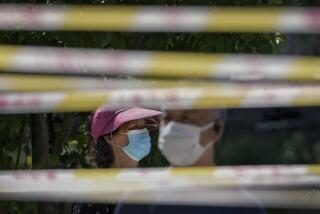Pneumonic plague reported in remote western China
- Share via
BEIJING — Chinese health officials have cordoned off a remote western town after three deaths caused by the rare but deadly pneumonic plague.
The victims lived in Ziketan, a town of 10,000 in Qinghai province, which is mostly populated by Tibetans.
The first victim was a 32-year-old herdsman who died Thursday, four days after falling ill with a fever and cough. State radio reported that the man contracted the illness from his dog, which apparently was infected by a flea.
The herdsman’s 37-year-old neighbor died Sunday and a 64-year-old man died Monday.
Nine other people were reported to be ill or under observation, one of them in critical condition, at the Tibetan Hospital of Xinghai county.
“Experts continue to carry out disinfecting and pest control work and are tracing people in contact with victims for quarantine purposes,” the New China News Agency reported Monday.
Pneumonic plague is the deadlier relative of the notorious bubonic plague, which killed millions in Europe in the Middle Ages. Spread person to person through the air, it usually kills all its victims unless they are treated with antibiotics.
In recent years, there have been sporadic outbreaks of the pneumonic plague, most of them in Africa. The few cases in China have been mostly in Tibetan areas in the west.
“In the 1980s, there was a series of plagues in Tibet, but recently not so many,” said Tseten Dargye, a physician in Dawu, another Tibetan town in Qinghai province. He said the disease was spread by ticks living on marmots, which are indigenous to the mountainous Tibetan region.
Zhang Changmin, a driver from Qinghai, said that all roads in and out of Ziketan had been closed since last week to prevent the disease from spreading.
So far the disease does not appear to be causing the panic brought on by the far less deadly swine flu, the threat of which has prompted Chinese authorities to put thousands of people into quarantine, among them U.S. tourists.
Vivian Tan, spokeswoman for the World Health Organization in China, said Monday that Ziketan’s remote location and the low population density reduces the threat of spread.
“At this point I don’t think there’s a reason to be alarmed,” she said. “Authorities seem to have taken the right measures.”
Tan said this is the first time the Chinese government has officially notified the WHO of cases of pneumonic plague. But she noted that there have been sporadic reports of the disease in the country before.
There were two other cases in Qinghai in recent years, in 2001 and in 2004. Last year, pneumonic plague killed a couple in Tibet, officials said.
--
More to Read
Sign up for Essential California
The most important California stories and recommendations in your inbox every morning.
You may occasionally receive promotional content from the Los Angeles Times.












